1806NRS: Effective Communication Essay - Semester 1, 2019
VerifiedAdded on 2022/10/18
|6
|1669
|14
Essay
AI Summary
This essay, prepared for the 1806NRS Communicating Effectively assessment, explores the critical role of effective communication for Registered Nurses (RNs) in healthcare settings. It begins by emphasizing the importance of communication in fostering positive patient-nurse relationships and improving patient outcomes. The essay then details three effective verbal communication strategies, including active listening, empathy, and cultural sensitivity, highlighting their significance in supporting safe and caring nursing practice. Furthermore, it outlines two non-verbal communication behaviors that can act as barriers to effective communication, such as lack of motivation and negative emotional states, and their impact on patient interactions. The essay underscores the importance of communication skills in enhancing patient safety, reducing errors, and improving the overall quality of care. The essay concludes by reiterating the importance of nurses adopting effective communication techniques to ensure patient satisfaction and well-being.
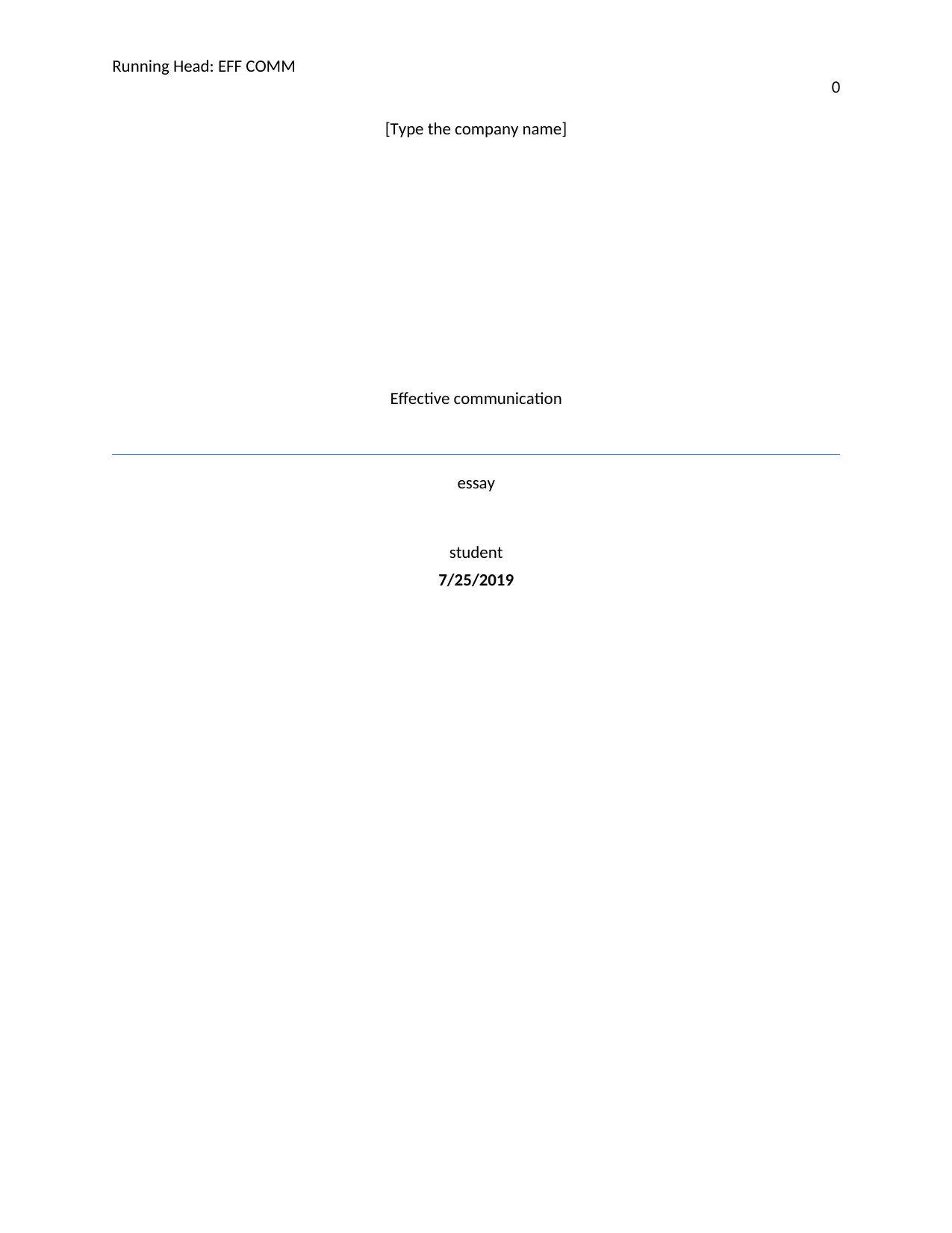
Running Head: EFF COMM
0
[Type the company name]
Effective communication
essay
student
7/25/2019
0
[Type the company name]
Effective communication
essay
student
7/25/2019
Paraphrase This Document
Need a fresh take? Get an instant paraphrase of this document with our AI Paraphraser
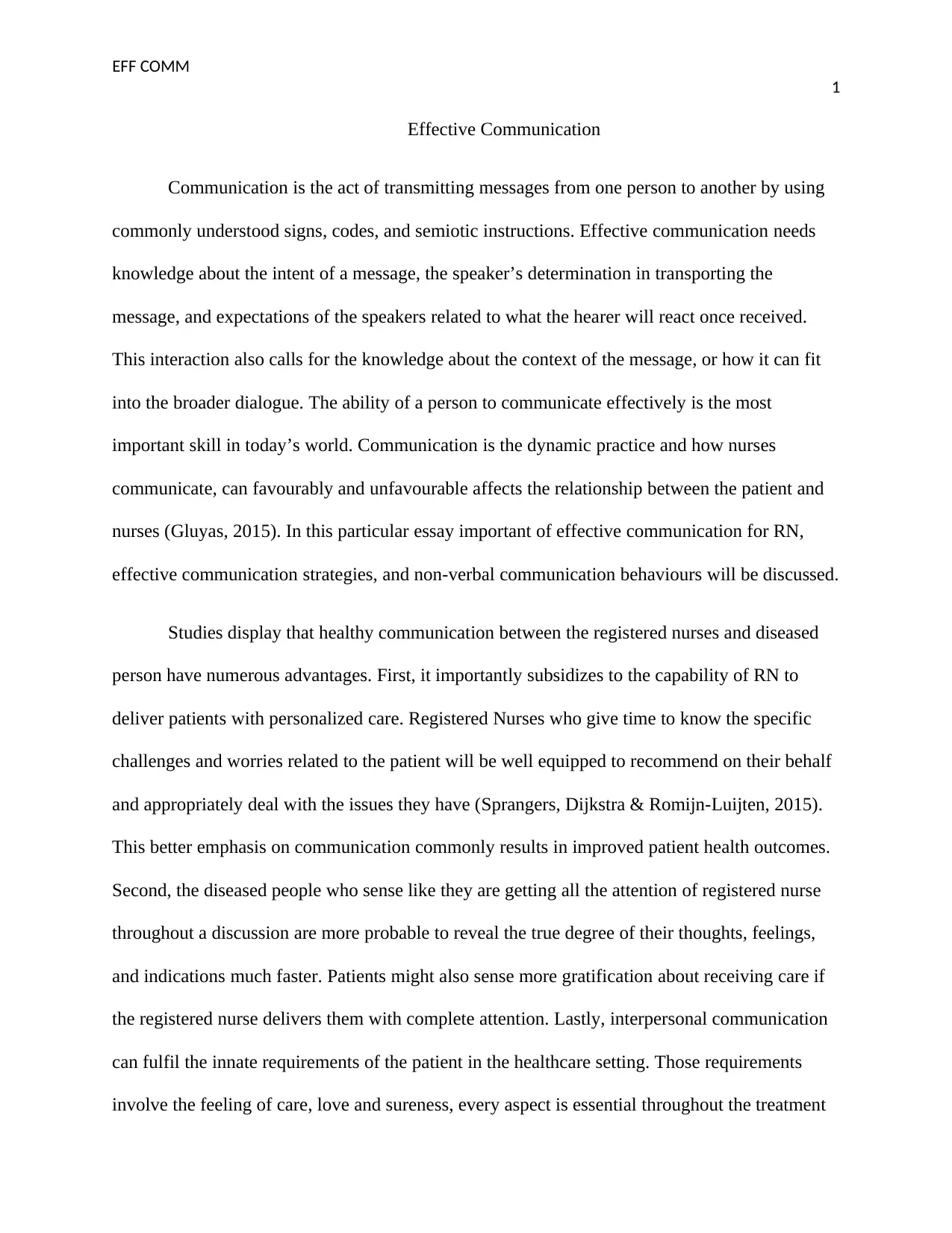
EFF COMM
1
Effective Communication
Communication is the act of transmitting messages from one person to another by using
commonly understood signs, codes, and semiotic instructions. Effective communication needs
knowledge about the intent of a message, the speaker’s determination in transporting the
message, and expectations of the speakers related to what the hearer will react once received.
This interaction also calls for the knowledge about the context of the message, or how it can fit
into the broader dialogue. The ability of a person to communicate effectively is the most
important skill in today’s world. Communication is the dynamic practice and how nurses
communicate, can favourably and unfavourable affects the relationship between the patient and
nurses (Gluyas, 2015). In this particular essay important of effective communication for RN,
effective communication strategies, and non-verbal communication behaviours will be discussed.
Studies display that healthy communication between the registered nurses and diseased
person have numerous advantages. First, it importantly subsidizes to the capability of RN to
deliver patients with personalized care. Registered Nurses who give time to know the specific
challenges and worries related to the patient will be well equipped to recommend on their behalf
and appropriately deal with the issues they have (Sprangers, Dijkstra & Romijn-Luijten, 2015).
This better emphasis on communication commonly results in improved patient health outcomes.
Second, the diseased people who sense like they are getting all the attention of registered nurse
throughout a discussion are more probable to reveal the true degree of their thoughts, feelings,
and indications much faster. Patients might also sense more gratification about receiving care if
the registered nurse delivers them with complete attention. Lastly, interpersonal communication
can fulfil the innate requirements of the patient in the healthcare setting. Those requirements
involve the feeling of care, love and sureness, every aspect is essential throughout the treatment
1
Effective Communication
Communication is the act of transmitting messages from one person to another by using
commonly understood signs, codes, and semiotic instructions. Effective communication needs
knowledge about the intent of a message, the speaker’s determination in transporting the
message, and expectations of the speakers related to what the hearer will react once received.
This interaction also calls for the knowledge about the context of the message, or how it can fit
into the broader dialogue. The ability of a person to communicate effectively is the most
important skill in today’s world. Communication is the dynamic practice and how nurses
communicate, can favourably and unfavourable affects the relationship between the patient and
nurses (Gluyas, 2015). In this particular essay important of effective communication for RN,
effective communication strategies, and non-verbal communication behaviours will be discussed.
Studies display that healthy communication between the registered nurses and diseased
person have numerous advantages. First, it importantly subsidizes to the capability of RN to
deliver patients with personalized care. Registered Nurses who give time to know the specific
challenges and worries related to the patient will be well equipped to recommend on their behalf
and appropriately deal with the issues they have (Sprangers, Dijkstra & Romijn-Luijten, 2015).
This better emphasis on communication commonly results in improved patient health outcomes.
Second, the diseased people who sense like they are getting all the attention of registered nurse
throughout a discussion are more probable to reveal the true degree of their thoughts, feelings,
and indications much faster. Patients might also sense more gratification about receiving care if
the registered nurse delivers them with complete attention. Lastly, interpersonal communication
can fulfil the innate requirements of the patient in the healthcare setting. Those requirements
involve the feeling of care, love and sureness, every aspect is essential throughout the treatment
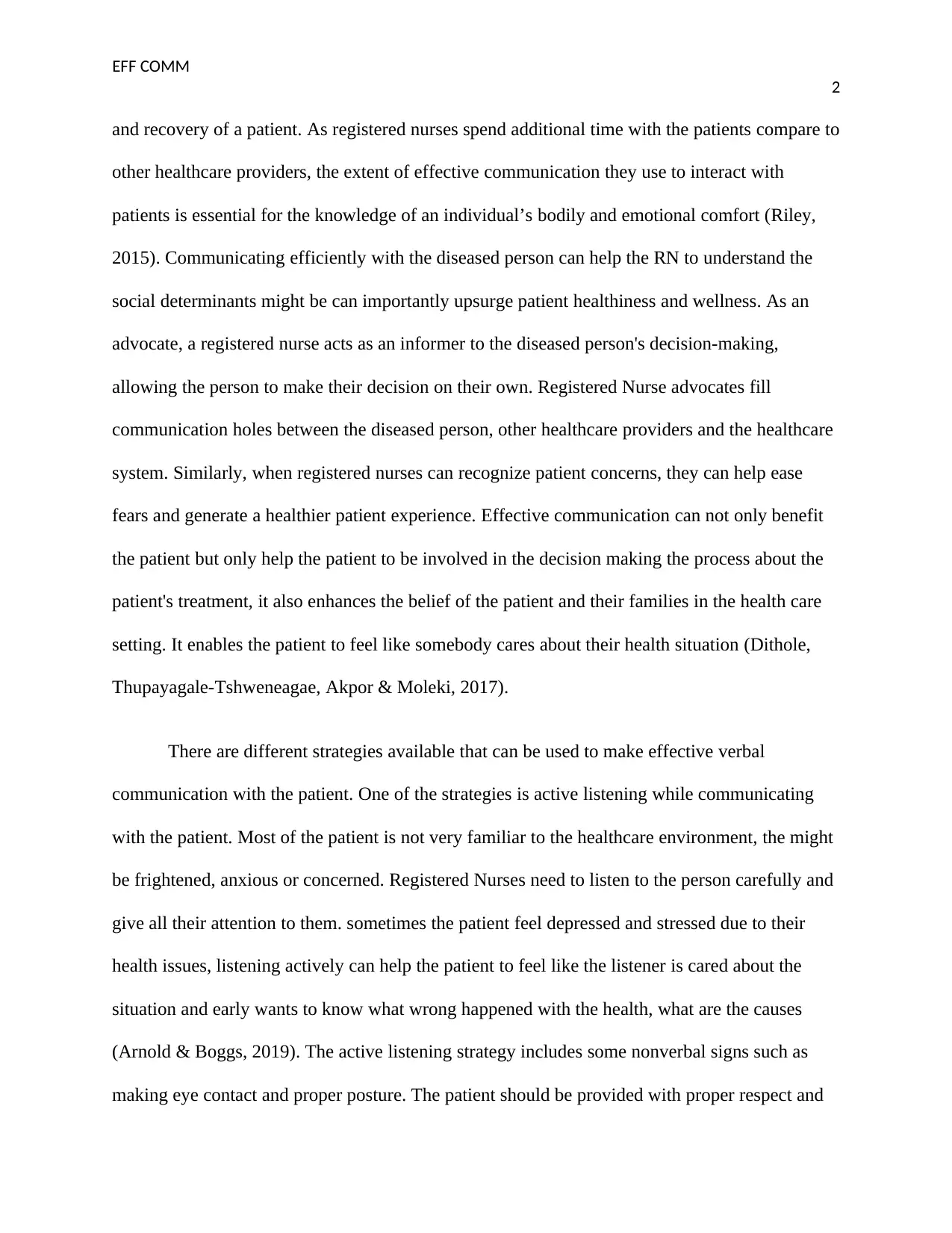
EFF COMM
2
and recovery of a patient. As registered nurses spend additional time with the patients compare to
other healthcare providers, the extent of effective communication they use to interact with
patients is essential for the knowledge of an individual’s bodily and emotional comfort (Riley,
2015). Communicating efficiently with the diseased person can help the RN to understand the
social determinants might be can importantly upsurge patient healthiness and wellness. As an
advocate, a registered nurse acts as an informer to the diseased person's decision-making,
allowing the person to make their decision on their own. Registered Nurse advocates fill
communication holes between the diseased person, other healthcare providers and the healthcare
system. Similarly, when registered nurses can recognize patient concerns, they can help ease
fears and generate a healthier patient experience. Effective communication can not only benefit
the patient but only help the patient to be involved in the decision making the process about the
patient's treatment, it also enhances the belief of the patient and their families in the health care
setting. It enables the patient to feel like somebody cares about their health situation (Dithole,
Thupayagale-Tshweneagae, Akpor & Moleki, 2017).
There are different strategies available that can be used to make effective verbal
communication with the patient. One of the strategies is active listening while communicating
with the patient. Most of the patient is not very familiar to the healthcare environment, the might
be frightened, anxious or concerned. Registered Nurses need to listen to the person carefully and
give all their attention to them. sometimes the patient feel depressed and stressed due to their
health issues, listening actively can help the patient to feel like the listener is cared about the
situation and early wants to know what wrong happened with the health, what are the causes
(Arnold & Boggs, 2019). The active listening strategy includes some nonverbal signs such as
making eye contact and proper posture. The patient should be provided with proper respect and
2
and recovery of a patient. As registered nurses spend additional time with the patients compare to
other healthcare providers, the extent of effective communication they use to interact with
patients is essential for the knowledge of an individual’s bodily and emotional comfort (Riley,
2015). Communicating efficiently with the diseased person can help the RN to understand the
social determinants might be can importantly upsurge patient healthiness and wellness. As an
advocate, a registered nurse acts as an informer to the diseased person's decision-making,
allowing the person to make their decision on their own. Registered Nurse advocates fill
communication holes between the diseased person, other healthcare providers and the healthcare
system. Similarly, when registered nurses can recognize patient concerns, they can help ease
fears and generate a healthier patient experience. Effective communication can not only benefit
the patient but only help the patient to be involved in the decision making the process about the
patient's treatment, it also enhances the belief of the patient and their families in the health care
setting. It enables the patient to feel like somebody cares about their health situation (Dithole,
Thupayagale-Tshweneagae, Akpor & Moleki, 2017).
There are different strategies available that can be used to make effective verbal
communication with the patient. One of the strategies is active listening while communicating
with the patient. Most of the patient is not very familiar to the healthcare environment, the might
be frightened, anxious or concerned. Registered Nurses need to listen to the person carefully and
give all their attention to them. sometimes the patient feel depressed and stressed due to their
health issues, listening actively can help the patient to feel like the listener is cared about the
situation and early wants to know what wrong happened with the health, what are the causes
(Arnold & Boggs, 2019). The active listening strategy includes some nonverbal signs such as
making eye contact and proper posture. The patient should be provided with proper respect and
⊘ This is a preview!⊘
Do you want full access?
Subscribe today to unlock all pages.

Trusted by 1+ million students worldwide
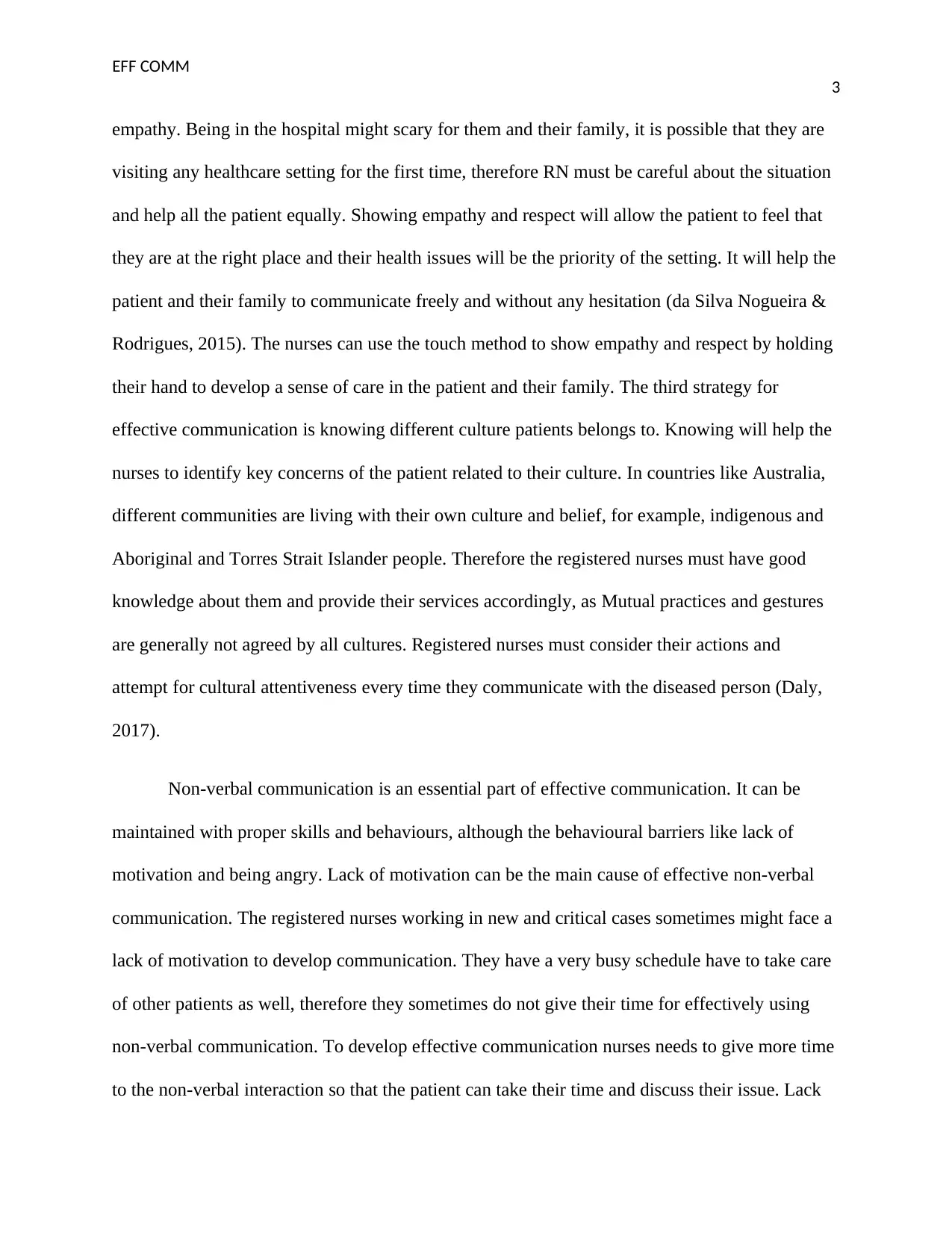
EFF COMM
3
empathy. Being in the hospital might scary for them and their family, it is possible that they are
visiting any healthcare setting for the first time, therefore RN must be careful about the situation
and help all the patient equally. Showing empathy and respect will allow the patient to feel that
they are at the right place and their health issues will be the priority of the setting. It will help the
patient and their family to communicate freely and without any hesitation (da Silva Nogueira &
Rodrigues, 2015). The nurses can use the touch method to show empathy and respect by holding
their hand to develop a sense of care in the patient and their family. The third strategy for
effective communication is knowing different culture patients belongs to. Knowing will help the
nurses to identify key concerns of the patient related to their culture. In countries like Australia,
different communities are living with their own culture and belief, for example, indigenous and
Aboriginal and Torres Strait Islander people. Therefore the registered nurses must have good
knowledge about them and provide their services accordingly, as Mutual practices and gestures
are generally not agreed by all cultures. Registered nurses must consider their actions and
attempt for cultural attentiveness every time they communicate with the diseased person (Daly,
2017).
Non-verbal communication is an essential part of effective communication. It can be
maintained with proper skills and behaviours, although the behavioural barriers like lack of
motivation and being angry. Lack of motivation can be the main cause of effective non-verbal
communication. The registered nurses working in new and critical cases sometimes might face a
lack of motivation to develop communication. They have a very busy schedule have to take care
of other patients as well, therefore they sometimes do not give their time for effectively using
non-verbal communication. To develop effective communication nurses needs to give more time
to the non-verbal interaction so that the patient can take their time and discuss their issue. Lack
3
empathy. Being in the hospital might scary for them and their family, it is possible that they are
visiting any healthcare setting for the first time, therefore RN must be careful about the situation
and help all the patient equally. Showing empathy and respect will allow the patient to feel that
they are at the right place and their health issues will be the priority of the setting. It will help the
patient and their family to communicate freely and without any hesitation (da Silva Nogueira &
Rodrigues, 2015). The nurses can use the touch method to show empathy and respect by holding
their hand to develop a sense of care in the patient and their family. The third strategy for
effective communication is knowing different culture patients belongs to. Knowing will help the
nurses to identify key concerns of the patient related to their culture. In countries like Australia,
different communities are living with their own culture and belief, for example, indigenous and
Aboriginal and Torres Strait Islander people. Therefore the registered nurses must have good
knowledge about them and provide their services accordingly, as Mutual practices and gestures
are generally not agreed by all cultures. Registered nurses must consider their actions and
attempt for cultural attentiveness every time they communicate with the diseased person (Daly,
2017).
Non-verbal communication is an essential part of effective communication. It can be
maintained with proper skills and behaviours, although the behavioural barriers like lack of
motivation and being angry. Lack of motivation can be the main cause of effective non-verbal
communication. The registered nurses working in new and critical cases sometimes might face a
lack of motivation to develop communication. They have a very busy schedule have to take care
of other patients as well, therefore they sometimes do not give their time for effectively using
non-verbal communication. To develop effective communication nurses needs to give more time
to the non-verbal interaction so that the patient can take their time and discuss their issue. Lack
Paraphrase This Document
Need a fresh take? Get an instant paraphrase of this document with our AI Paraphraser
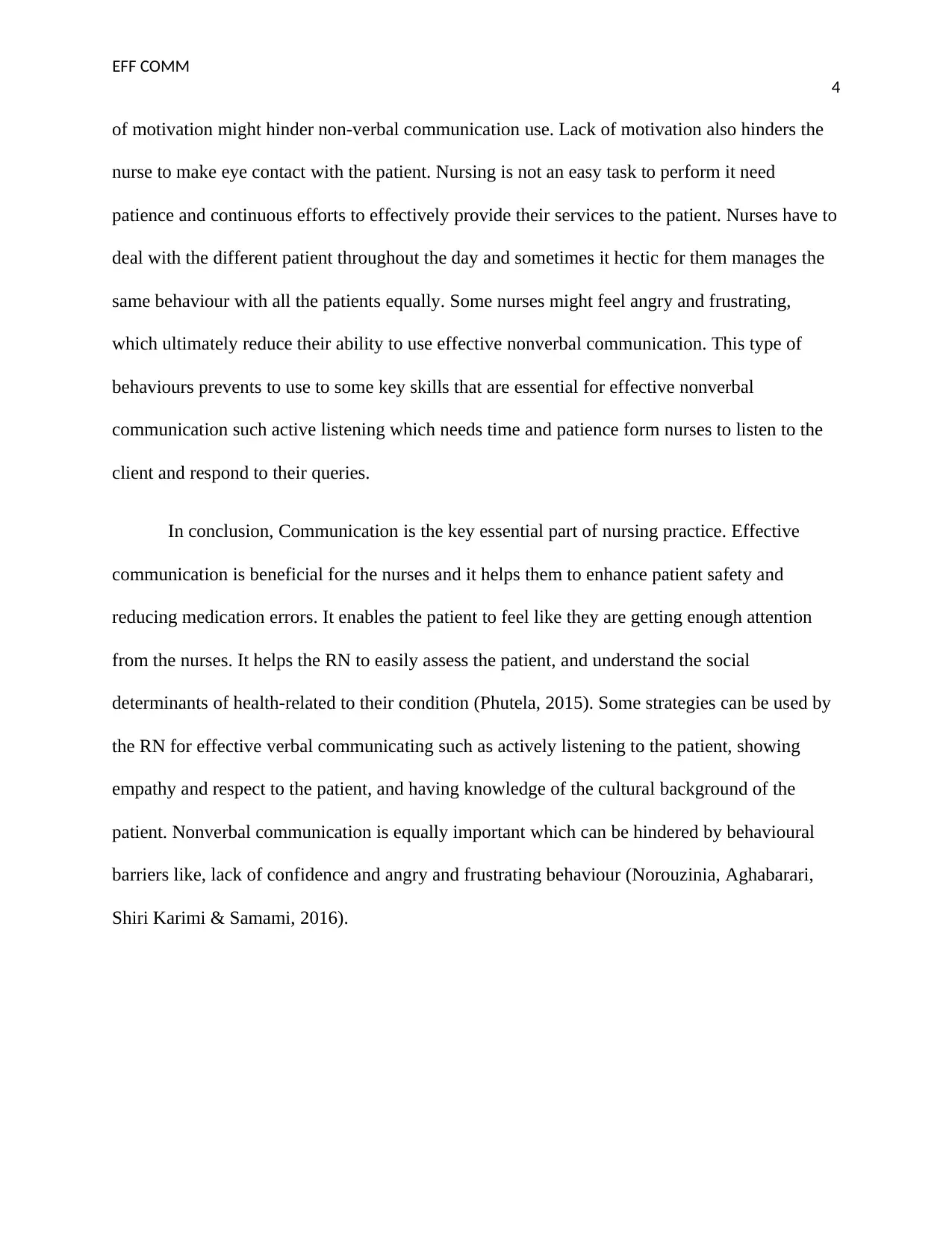
EFF COMM
4
of motivation might hinder non-verbal communication use. Lack of motivation also hinders the
nurse to make eye contact with the patient. Nursing is not an easy task to perform it need
patience and continuous efforts to effectively provide their services to the patient. Nurses have to
deal with the different patient throughout the day and sometimes it hectic for them manages the
same behaviour with all the patients equally. Some nurses might feel angry and frustrating,
which ultimately reduce their ability to use effective nonverbal communication. This type of
behaviours prevents to use to some key skills that are essential for effective nonverbal
communication such active listening which needs time and patience form nurses to listen to the
client and respond to their queries.
In conclusion, Communication is the key essential part of nursing practice. Effective
communication is beneficial for the nurses and it helps them to enhance patient safety and
reducing medication errors. It enables the patient to feel like they are getting enough attention
from the nurses. It helps the RN to easily assess the patient, and understand the social
determinants of health-related to their condition (Phutela, 2015). Some strategies can be used by
the RN for effective verbal communicating such as actively listening to the patient, showing
empathy and respect to the patient, and having knowledge of the cultural background of the
patient. Nonverbal communication is equally important which can be hindered by behavioural
barriers like, lack of confidence and angry and frustrating behaviour (Norouzinia, Aghabarari,
Shiri Karimi & Samami, 2016).
4
of motivation might hinder non-verbal communication use. Lack of motivation also hinders the
nurse to make eye contact with the patient. Nursing is not an easy task to perform it need
patience and continuous efforts to effectively provide their services to the patient. Nurses have to
deal with the different patient throughout the day and sometimes it hectic for them manages the
same behaviour with all the patients equally. Some nurses might feel angry and frustrating,
which ultimately reduce their ability to use effective nonverbal communication. This type of
behaviours prevents to use to some key skills that are essential for effective nonverbal
communication such active listening which needs time and patience form nurses to listen to the
client and respond to their queries.
In conclusion, Communication is the key essential part of nursing practice. Effective
communication is beneficial for the nurses and it helps them to enhance patient safety and
reducing medication errors. It enables the patient to feel like they are getting enough attention
from the nurses. It helps the RN to easily assess the patient, and understand the social
determinants of health-related to their condition (Phutela, 2015). Some strategies can be used by
the RN for effective verbal communicating such as actively listening to the patient, showing
empathy and respect to the patient, and having knowledge of the cultural background of the
patient. Nonverbal communication is equally important which can be hindered by behavioural
barriers like, lack of confidence and angry and frustrating behaviour (Norouzinia, Aghabarari,
Shiri Karimi & Samami, 2016).
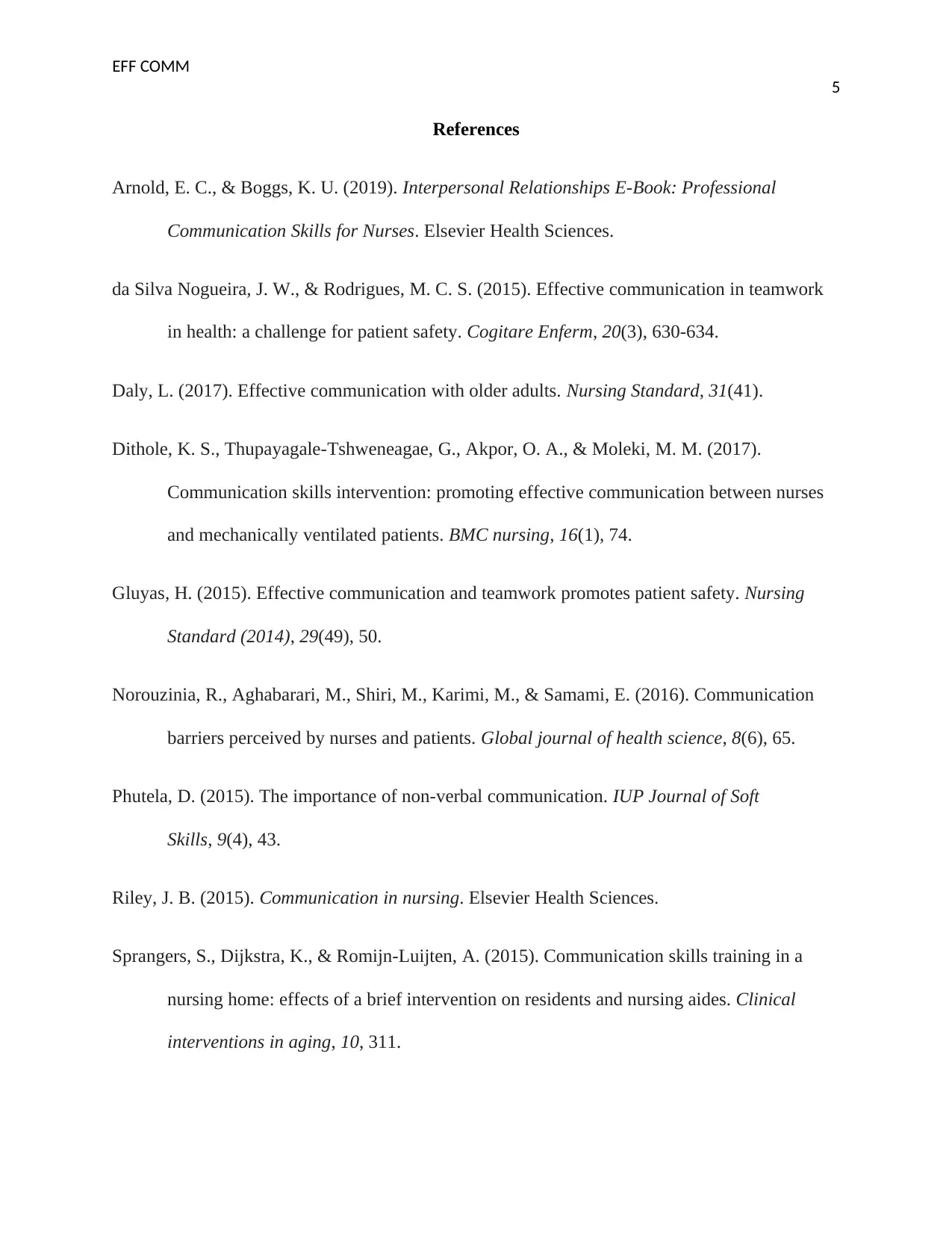
EFF COMM
5
References
Arnold, E. C., & Boggs, K. U. (2019). Interpersonal Relationships E-Book: Professional
Communication Skills for Nurses. Elsevier Health Sciences.
da Silva Nogueira, J. W., & Rodrigues, M. C. S. (2015). Effective communication in teamwork
in health: a challenge for patient safety. Cogitare Enferm, 20(3), 630-634.
Daly, L. (2017). Effective communication with older adults. Nursing Standard, 31(41).
Dithole, K. S., Thupayagale-Tshweneagae, G., Akpor, O. A., & Moleki, M. M. (2017).
Communication skills intervention: promoting effective communication between nurses
and mechanically ventilated patients. BMC nursing, 16(1), 74.
Gluyas, H. (2015). Effective communication and teamwork promotes patient safety. Nursing
Standard (2014), 29(49), 50.
Norouzinia, R., Aghabarari, M., Shiri, M., Karimi, M., & Samami, E. (2016). Communication
barriers perceived by nurses and patients. Global journal of health science, 8(6), 65.
Phutela, D. (2015). The importance of non-verbal communication. IUP Journal of Soft
Skills, 9(4), 43.
Riley, J. B. (2015). Communication in nursing. Elsevier Health Sciences.
Sprangers, S., Dijkstra, K., & Romijn-Luijten, A. (2015). Communication skills training in a
nursing home: effects of a brief intervention on residents and nursing aides. Clinical
interventions in aging, 10, 311.
5
References
Arnold, E. C., & Boggs, K. U. (2019). Interpersonal Relationships E-Book: Professional
Communication Skills for Nurses. Elsevier Health Sciences.
da Silva Nogueira, J. W., & Rodrigues, M. C. S. (2015). Effective communication in teamwork
in health: a challenge for patient safety. Cogitare Enferm, 20(3), 630-634.
Daly, L. (2017). Effective communication with older adults. Nursing Standard, 31(41).
Dithole, K. S., Thupayagale-Tshweneagae, G., Akpor, O. A., & Moleki, M. M. (2017).
Communication skills intervention: promoting effective communication between nurses
and mechanically ventilated patients. BMC nursing, 16(1), 74.
Gluyas, H. (2015). Effective communication and teamwork promotes patient safety. Nursing
Standard (2014), 29(49), 50.
Norouzinia, R., Aghabarari, M., Shiri, M., Karimi, M., & Samami, E. (2016). Communication
barriers perceived by nurses and patients. Global journal of health science, 8(6), 65.
Phutela, D. (2015). The importance of non-verbal communication. IUP Journal of Soft
Skills, 9(4), 43.
Riley, J. B. (2015). Communication in nursing. Elsevier Health Sciences.
Sprangers, S., Dijkstra, K., & Romijn-Luijten, A. (2015). Communication skills training in a
nursing home: effects of a brief intervention on residents and nursing aides. Clinical
interventions in aging, 10, 311.
⊘ This is a preview!⊘
Do you want full access?
Subscribe today to unlock all pages.

Trusted by 1+ million students worldwide
1 out of 6
Related Documents
Your All-in-One AI-Powered Toolkit for Academic Success.
+13062052269
info@desklib.com
Available 24*7 on WhatsApp / Email
![[object Object]](/_next/static/media/star-bottom.7253800d.svg)
Unlock your academic potential
Copyright © 2020–2026 A2Z Services. All Rights Reserved. Developed and managed by ZUCOL.





